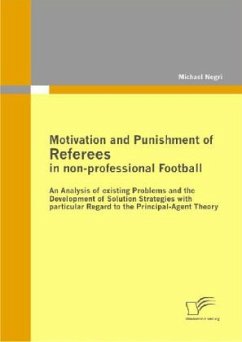Making people act the way oneself wishes is a challenging task in private and professional life. Scientific literature proposes two basic approaches to make people comply with one's interests in this context. One way is to foster the persons' intrinsic motivation or to offer extrinsic rewards. The other method is to punish misbehaviour by removing something pleasant or presenting something aversive to a person. Regardless which approach is chosen, the measures taken have to be oriented towards the persons characters and the existing circumstances to be effective.
This work answers the question of how problems resulting from a constellation in which someone acts on behalf of another person can be reduced or even solved. This type of interaction between two parties is referred to as 'Principal-Agent Theory' in literature and represents the theoretical basis of the work.
As a practical example, the case of football referees in the district of Guetersloh, Germany, is consulted. In order to back up the findings from the Principal-Agent Theory, an empirical analysis delivers further solution mechanisms. Basing on this case, the author shows which motivational aspects influence human behaviour and provides practical recommendations to make people act in accordance with one s own interests. In this regard, the role of punishment is also evaluated and it is shown how this form of negative enforcement has to be set up to be effective.
The work therefore offers guidance and tools for people who have to manage others and helps to understand why people act the way they do.
This work answers the question of how problems resulting from a constellation in which someone acts on behalf of another person can be reduced or even solved. This type of interaction between two parties is referred to as 'Principal-Agent Theory' in literature and represents the theoretical basis of the work.
As a practical example, the case of football referees in the district of Guetersloh, Germany, is consulted. In order to back up the findings from the Principal-Agent Theory, an empirical analysis delivers further solution mechanisms. Basing on this case, the author shows which motivational aspects influence human behaviour and provides practical recommendations to make people act in accordance with one s own interests. In this regard, the role of punishment is also evaluated and it is shown how this form of negative enforcement has to be set up to be effective.
The work therefore offers guidance and tools for people who have to manage others and helps to understand why people act the way they do.








